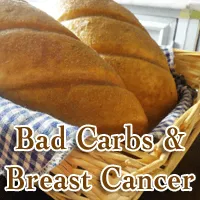Although there has been little evidence to show that a diet high in carbohydrates increases risks in young women, recent research published in the American Journal of Clinical Nutrition suggests that post menopausal women who eat high glycemic foods may be putting themselves at risk for developing one of the most aggressive forms of breast cancer.

Aggressive Breast Cancer and High Risk Foods
Researchers studied post menopausal women for more than 11 years, examining their diet and the development of breast cancer. Approximately 12 percent of women develop breast cancer during their life. The most aggressive form of breast cancer is estrogen receptor negative cancer, which develops quickly and does not respond to hormone-based therapies used with other types of breast cancer. Although chemotherapy may be used to treat ER-negative breast cancer, it is less successful than hormone-based therapies used with ER-positive breast cancer.
One of the factors that contributes to the development of ER-negative breast cancer is elevated levels of insulin. Women who eat diets that include large amounts of white bread, starchy foods, sweets and other high glycemic foods have elevated levels of insulin, often as a precursor to developing type 2 diabetes. High insulin levels helps cancer tumors grow and thrive.
Foods that lower blood sugar include dense whole wheat breads and alternative vegetables, such as turnips instead of potatoes. Try adding foods such as broccoli, which is rich in cancer fighting phytochemicals, green tea and whole soy sources.
Eating a diet rich in colorful fruits and vegetables, limiting alcohol intake and eating low glycemic whole grain foods can reduce a woman’s risk of developing breast cancer, particularly the ER-negative type. Regular exercise and maintaining a healthy weight also help reduce cancer risk, in addition to improving cardiovascular function and reducing the risk of developing progressive illnesses, such as diabetes.
– The Alternative Daily
